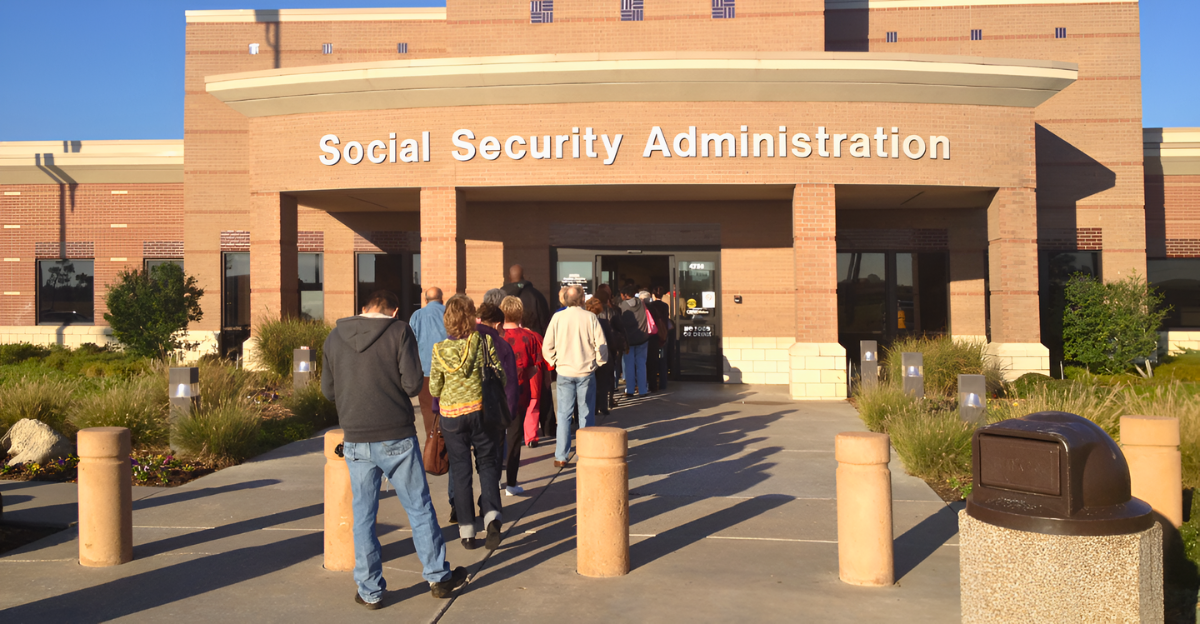
The Social Security trust fund is expected to run out by 2033, affecting around 71.6 million Americans with potential benefit cuts.
While some analyses suggest across-the-board reductions could be around 23% if no action is taken, more extreme scenarios estimate that cuts could be as much as 40%, depending on policy changes or delayed congressional action.
Maya McGuineas from the Committee for a Responsible Federal Budget warns that full benefits may not be sustainable for current retirees. Without congressional intervention, beneficiaries could face automatic cuts of 23%.
Accelerating Timeline

Recent legislation has accelerated the timeline for fund depletion, moving the expected date from 2035 to 2033, according to trustees. This shift reflects overall changes in the Social Security fund’s finances, according to trustees.
Budget watchdog McGuineas has raised concerns, asking, “Where is the sense of urgency?” as the deadline comes closer than anticipated.
Historical Context

Social Security has implemented a gradual increase in the retirement age from 65 to 67 for individuals born after 1959. This change was introduced to account for the increasing life expectancies of the population.
As a result, the full retirement age varies for workers according to their birth year, with those born in 1960 or later reaching a full retirement age of 67.
Mounting Pressures

The Social Security system is increasingly strained, now supporting more retirees with fewer workers contributing. There are only 2.8 workers for each beneficiary, down from 5.1 in 1960.
This decline is due to falling birth rates and the retirement of approximately 11,000 baby boomers each day, complicating the pay-as-you-go system that relies on current workers to fund retirees’ benefits.
Congressional Proposal

The Republican Study Committee, which represents 170 House GOP lawmakers, including Speaker Mike Johnson, proposed raising the retirement age to 69 in its 2024 budget.
This plan includes “modest adjustments” for future retirees to reflect increased life expectancy, while ensuring no immediate cuts for current retirees.
Regional Impact

Data shows that changes to the retirement age would impact Social Security beneficiaries nationwide.
California leads with about 7 million recipients, followed by Florida with 5.4 million and Texas with 5 million. Even smaller states like Wyoming would see around 130,000 beneficiaries affected.
Toll On Jobs

Experts caution that increasing retirement ages could disproportionately impact workers in physically demanding occupations. Policy analysts point out that professions such as construction, nursing, and factory work require significant physical exertion.
As a result, many of these laborers face challenges continuing their work past age 65 due to health concerns and the physical strain associated with their jobs.
Early Retirement Reality

Research indicates that a significant portion of retirees choose to claim reduced benefits by opting for early retirement before reaching full retirement age.
In 2023, nearly two-thirds of the 50 million retired workers received smaller payments. According to current legislation, individuals who begin collecting benefits at age 62 face a 30% reduction compared to those who wait until age 67 to retire.
Demographic Shift

Since Social Security began, life expectancy for Americans at age 65 has significantly increased from about 12-13 years in 1940 to 18-21 years today.
This longer lifespan leads to extended benefit payouts, while the birth rate has decreased from an average of 3.6 children per woman to just 1.6, adding to the financial strain on the system.
Mathematical Reality

Raising the retirement age to 69 while allowing early claiming at 62 could significantly reduce benefits, depending on claiming choices and policy changes.
This calculation is based on the 84 months of early claiming under the Social Security Administration’s reduction formula. In SSA projections, this scenario is one illustrative option, sometimes labeled C1.7, showing how early claiming could affect benefits.
Industry Frustration

Labor unions strongly oppose raising retirement age, saying they hurt blue-collar workers most. Max Richtman from the National Committee to Preserve Social Security states that “a raise in the retirement age is a reduction in benefits.”
Physical workers often cannot continue past 65 due to job demands and declining health.
Political Dynamics

During his campaign, President Trump stated opposition to raising retirement ages or cutting Social Security benefits, telling House Republicans in 2023 that they should not vote to reduce Medicare or Social Security.
However, many in his party support different approaches to fix the system.
Reform Proposals

Policy experts suggest raising the Social Security tax cap as an alternative to benefit cuts.
Currently, only wages up to $176,100 face Social Security taxes, covering 83% of total wages compared to 90% in 1983. Other options include means-testing benefits for high earners or creating bridge programs for older workers.
Expert Skepticism

Many Americans worry about Social Security’s future and consider claiming benefits early.
Financial experts note that disability benefits, which require intensive processing, might face more errors than retirement benefits under staffing cuts. Polling shows 78% of Americans oppose raising the retirement age from 67 to 70.
Forward Question

The clock ticks toward 2033 as Congress debates solutions to prevent automatic benefit cuts. Social Security trustees warn that the program faces its first-ever across-the-board reduction in scheduled benefits without action.
The longer lawmakers wait, the more severe any fixes become, forcing deeper cuts or higher taxes on future generations.
Political Stakes

Social Security reform could define upcoming elections as both parties avoid tough choices. Documents show that Republicans promised no benefit cuts while proposing retirement age increases.
Democrats attack GOP proposals while avoiding tax increase discussions. The issue creates political risks for whoever proposes real solutions first.
Economic Ripple Effects

Higher retirement ages could force more Americans into part-time work between 62 and 69, economists predict. Bridge employment might increase by 10-15%, adding roughly 600,000-900,000 workers to gig markets.
Reverse mortgage applications could surge by 150,000-250,000 as households delay claiming Social Security to avoid deeper cuts.
Staff Cuts Compound Crisis

The Social Security Administration plans to cut 7,000 workers, raising concerns about service delays. Greg Senden, a 27-year agency veteran, warns that “this will prolong the time it takes for claims to be processed.”
The workforce will shrink from 57,000 to 50,000 employees amid rising benefit applications.
Generational Divide

Surveys find that younger Americans increasingly doubt Social Security will exist for their retirement. Many assume reduced benefits in their planning, while older Americans fight to protect current payments.
The Pew Research Center notes growing tensions between generations over who should bear the cost of fixing the system.
Crossroads Moment

Social Security faces its biggest test since its creation, and solutions require tough political choices. Congress must act within eight years, whether through tax increases, benefit cuts, or retirement age changes.
Today’s decisions will determine if Social Security remains a reliable safety net or becomes another source of retirement anxiety for millions.